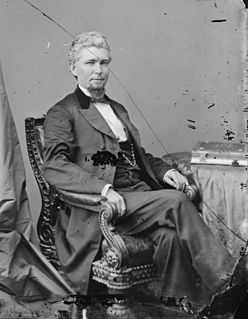Related Research Articles

Article One of the United States Constitution establishes the legislative branch of the federal government, the United States Congress. Under Article One, Congress is a bicameral legislature consisting of the House of Representatives and the Senate. Article One grants Congress various enumerated powers and the ability to pass laws "necessary and proper" to carry out those powers. Article One also establishes the procedures for passing a bill and places various limits on the powers of Congress and the states from abusing their powers.

The chief justice of the United States is the chief justice of the Supreme Court of the United States and the highest-ranking officer of the U.S. federal judiciary. Article II, Section 2, Clause 2 of the U.S. Constitution grants plenary power to the president of the United States to nominate, and with the advice and consent of the United States Senate, appoint "Judges of the supreme Court", who serve until they resign, retire, are impeached and convicted, or die. The existence of a chief justice is explicit in Article One, Section 3, Clause 6 which states that the chief justice shall preside on the impeachment trial of the president.

The federal government of the United States is the national government of the United States, a federal republic in North America, composed of 50 states, a federal district, five major self-governing territories and several island possessions. The federal government is composed of three distinct branches: legislative, executive, and judicial, whose powers are vested by the U.S. Constitution in the Congress, the president and the federal courts, respectively. The powers and duties of these branches are further defined by acts of Congress, including the creation of executive departments and courts inferior to the Supreme Court.

James Falconer "Jefferson Jim" Wilson was an American lawyer and politician. He served as a Republican U.S. Congressman from Iowa's 1st congressional district during the American Civil War, and later as a two-term U.S. Senator from Iowa. He was a pioneer in the advancement of federal protection for civil rights.

Dionisio "Dennis" Chávez was an American politician who served in the United States House of Representatives from 1931 to 1935, and in the United States Senate from 1935 to 1962. He was the first Hispanic to be elected to a full term in the US Senate and the first US Senator to be born in New Mexico, which was still a US territory at the time of his birth.

George Washington Campbell was an American statesman who served as a U.S. Representative, Senator, Tennessee Supreme Court Justice, U.S. Ambassador to Russia and the 5th United States Secretary of the Treasury from February to October 1814.

Augustus Octavius Bacon was a slave owner, Confederate soldier, segregationist, and U.S. politician. He served as a Democratic Party U.S. Senator from Georgia, and rose to the position of president pro tempore of the United States Senate. Controversy arose during the American Civil Rights Movement over a provision in his will that created a racially segregated park in his hometown of Macon, which led to two U.S. Supreme Court decisions.

Impeachment in the United States is the process by which a legislature's lower house brings charges against a civil federal officer, the vice president, or the president for misconduct alleged to have been committed. Impeachment may also occur at the state level if the state or commonwealth has provisions for it under its constitution. The federal House of Representatives can impeach a party with a simple majority of the House members present or such other criteria as the House adopts in accordance with Article One, Section 2, Clause 5 of the United States Constitution. Most state legislatures can impeach state officials, including the governor, in accordance with their respective state constitution.

The Alabama Republican Party is the state affiliate of the Republican Party in Alabama. It is the dominant political party in Alabama. The state party is governed by the Alabama Republican Executive Committee. The committee usually meets twice a year. As of the February 23, 2019 meeting in Birmingham, the committee is composed of 463 members. Most of the committee's members are elected in district elections across Alabama. The district members are elected in the Republican Primary once every four years, with the most recent election for the committee having been on June 5, 2018. The new committee takes office following the general election in November 2018. In addition, all 67 county GOP chairmen have automatic seats as voting members. The state chairman can appoint 10 members. Each county committee can appoint bonus members based on a formula that theoretically could add 312 seats, although that formula currently calls for only about 50 seats.

The Attending Physician of the United States Congress is the physician responsible for the medical welfare of the members of the United States Congress and the nine justices of the Supreme Court of the United States.
The Saxbe fix, or salary rollback, is a mechanism by which the President of the United States, in appointing a current or former member of the United States Congress whose elected term has not yet expired, can avoid the restriction of the United States Constitution's Ineligibility Clause. That clause prohibits the President from appointing a current or former member of Congress to a civil office position that was created, or to a civil office position for which the pay or benefits were increased, during the term for which that member was elected until the term has expired. The rollback, first implemented by an Act of Congress in 1909, reverts the emoluments of the office to the amount they were when that member began his or her elected term.
The Ineligibility Clause is a provision in Article 1, Section 6, Clause 2 of the United States Constitution that makes each incumbent member of Congress ineligible to hold an office established by the federal government during their tenure in Congress; it also bars officials in the federal government's executive and judicial branches from simultaneously serving in either the U.S. House or Senate. The purpose of the clause is twofold: first, to protect the separation of powers philosophy ; and second, to prevent Congress from conspiring to create offices or increase federal officials' salaries with the expectation that members of Congress would later be appointed to these posts.

David Davis was a United States Senator from Illinois and associate justice of the United States Supreme Court. He also served as Abraham Lincoln's campaign manager at the 1860 Republican National Convention, engineering Lincoln's successful nomination for President by that party.

George Alexander Sutherland was an English-born American jurist and politician. He served as an associate justice of the U.S. Supreme Court between 1922 and 1938. As a member of the Republican Party, he also represented Utah in both houses of Congress.

The nomination, confirmation, and appointment of Justices to the Supreme Court of the United States involves several steps set forth by the United States Constitution, which have been further refined and developed by decades of tradition. Candidates are nominated by the President of the United States and must face a series of hearings in which both the nominee and other witnesses make statements and answer questions before the Senate Judiciary Committee, which can vote to send the nomination to the full United States Senate. Confirmation by the Senate allows the President to formally appoint the candidate to the court. The Constitution does not set any qualifications for service as a Justice, thus the President may nominate any individual to serve on the Court.

The Ohio general elections, 2010 were held on November 2, 2010 throughout Ohio. Primary elections took place on May 4, 2010.

The 1890 and 1891 United States Senate elections were elections in which the Republican Party lost four seats in the United States Senate, though still retaining a slim majority. That majority was increased, however, upon the admission of two more states with Republican senators.
References
- ↑ O'Brien, David M. (2003). Storm Center: The Supreme Court in American Politics (6th ed.). W. W. Norton. p. 46. ISBN 0393978966.
- ↑ "Senators Who Served on the U.S. Supreme Court". Washington, D.C.: Secretary of the Senate. Retrieved February 6, 2018.
- ↑ "House Members Who Became U.S. Supreme Court Justices". Washington, D.C.: Office of the Historian and the Clerk of the House's Office of Art and Archives. Retrieved February 6, 2018.
